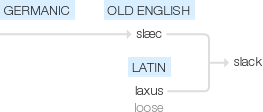Slack
Old English slæc ‘inclined to be lazy, unhurried’, of Germanic origin; related to Latin laxus ‘loose’.
wiktionary
From Middle English slak, from Old English slæc(“slack”), from Proto-Germanic *slakaz. For sense of coal dust, compare slag.
From Middle English slakken, slaken, from Old English slacian, from Proto-Germanic *slakōną(“to slack, slacken”).
Either from the adjective in Etymology 1 or the verb in Etymology 2.
From Middle English slak, from Old Norse slakki(“a slope”). Cognate with Icelandic slakki, Norwegian slakke.
Probably from German Schlacke(“dross, slag”). Doublet of slag.
etymonline
slack (adj.)
Old English slæc "remiss, lax, characterized by lack of energy, sluggish, indolent, languid; slow, gentle, easy," from Proto-Germanic *slakas (source also of Old Saxon slak, Old Norse slakr, Old High German slah "slack," Middle Dutch lac "fault, lack"), from PIE root *sleg- "be slack, be languid."
Sense of "not tight" (in reference to things) is first recorded c. 1300. As an adverb from late 14c. Slack-key (1975) translates Hawaiian ki ho'alu. Slack water (n.) "time when tide is not flowing" is from 1769. Slack-handed "remiss" is from 1670s. Slack-baked "baked imperfectly, half-baked" is from 1823; figuratively from 1840.
slack (n.1)
early 14c., "cessation" (of pain, grief, etc.), from slack (adj.). Meaning "a cessation of flow in a current or tide" is from 1756; that of "still stretch of a river" is from 1825. Meaning "loose part or end" (of a rope, sail, etc.) is from 1794; hence figurative senses in take up the slack (1930 figuratively) and slang cut (someone) some slack (1968). Meaning "quiet period, lull" is from 1851. Slacks "loose trousers" first recorded 1824, originally military.
slack (n.2)
"coal dust," mid-15c., sleck, of uncertain origin, probably related to Middle Dutch slacke, Middle Low German slecke "slag, small pieces left after coal is screened," perhaps related to slagge "splinter flying off metal when it is struck" (see slag (n.)).
slack (v.)
1510s, "to moderate, make slack," back-formed from slack (adj.) after the original verb veered into the specialized sense of slake. Meaning "be remiss, inactive or idle, fail to exert oneself" is attested from 1540s; current use is probably a re-coining from c. 1904 (see slacker, and compare Old English slacful "lazy," sleacmodnes "laziness"). Related: Slacked; slacking.
